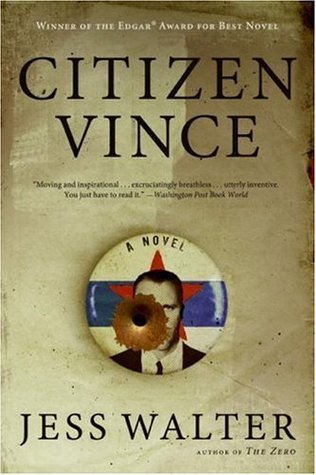 Jess Walter has that magic
something that puts him a notch above most contemporary novelists.
There are so many ways in which this novel about a small time criminal
living in Spokane, WA in a witness protection program could have gone
wrong. Basic plot elements, style and characters could easily have led
this book straight into the immense garbage bin where not-that-good
crime novels belong. But Walter adds his secret ingredients and this
potentially weak noir story becomes a unique, brilliant, powerful,
living and breathing work with the complexity and the cohesion of the
best novels ever written.
Jess Walter has that magic
something that puts him a notch above most contemporary novelists.
There are so many ways in which this novel about a small time criminal
living in Spokane, WA in a witness protection program could have gone
wrong. Basic plot elements, style and characters could easily have led
this book straight into the immense garbage bin where not-that-good
crime novels belong. But Walter adds his secret ingredients and this
potentially weak noir story becomes a unique, brilliant, powerful,
living and breathing work with the complexity and the cohesion of the
best novels ever written. Some reviewers said this is a book about citizenship as a conquer, and they are right. Some other reviewers said this is a book about redemption, and they are also right. Someone else said this book cannot be categorized or clearly labeled under a genre. I agree with that, too.
These are the main elements that elevate this book:
- the unusual level of depth and intelligence (many memorable sentences and moments when you think "wow, that is actually right")
- the ability to make his characters jump out of the page and be true and alive. You know how sometimes you feel a character in a book is being played by a b-movie actor? Well, it's as if Walter's characters were played by some of the best movie stars.
- the smart, omnipresent sense of humor.
- and, of course, the political sub-plot, centered on the presidential elections of 1980 and the meaning that political participation can add to an individual's life. Now, let's talk about this for a second. Too often I've seen authors trying to give me the "sub-plot" thing, while in reality what they were doing was just patching together different pieces of thoughts and failing miserably. One example of this kind of failure, even if I am referring to a movie, is "Killing them softly", with Brad Pitt. They tried to infuse that film with a "political sub-plot", failing in a spectacular way. While the main simple plot develops, TV screens with Obama speeches go on in the background. Those TV scenes in the background and a final cynical comment made by one character, do NOT make a political subplot. In "Citizen Vince", EVERYTHING converges to that focal point: the relationship between the individual citizen and the wider community, expressed in the right to vote. The meaning of your life as part of a much wider thing, the responsibility that comes with that and the privilege that it is to be a part of the democratic process, without any excessive patriotism or idealism, with all the proper doubts and questions posed at the right time, but with a message that comes out loud and clear despite the apparent simplicity of the plot.
I'm in pain. To know that I will never be able to write like Jess Walter is a childish but really painful thought.
No comments:
Post a Comment